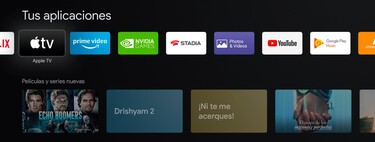Just a year ago, Apple TV+ landed on Android TV and Google TV with its own application that is practically identical to that of Apple devices. Enjoying award-winning series like Ted Lasso or films like Greyhound or Finch with actors like Tom Hanks is now possible on more and more devices. However, there is a very clear downside.
Downloading the Apple TV application from Google Play is simple, but the disadvantage that we are commenting on is not only in the operating system of Android televisions, but also in the mobile ecosystem and even in those who want to take advantage of the Apple catalog TV+ under Windows . And that’s it, if you don’t have an Apple device you will have it extremely complicated. Either you pay with their cheapest device or you break the privacy of a friend or family member.
No iPhone, iPad or Mac, no Apple TV+

If you are not a user of at least one of these Apple products, you can have the Apple TV app very conveniently located on your Android TV, you can even enter and maybe even navigate through the app. Now well, you will not be able to enjoy a single content
Having owned an Apple device in the past might save you, but not always.
And it is that really the need for one of these devices is not so much that they must be operational to synchronize content or something similar. What happens is that yes or yes you need an apple id to do it. And to your misfortune on this occasion, if you want to create an Apple account, you will need at least one of its flagship devices, being able to create said account during the initial setup of it.
If you’ve had an Apple device in the past and you still have your account and password, it can still help you to log into the Apple TV app on your Android TV. Although this is not always the case, because in case of enabling two-factor authentication, an Apple device might be required to complete the steps.
Sharing your account is not a safe (or private) option

While platf orms like Netflix already warn that they will ban account sharing, this is still possible today simply by giving someone else an email and password. However, the Apple TV+ case is very unique in this section
Sharing an Apple account gives access to photos, contacts, messages and a multitude of related data.
And what is the problem? They could perfectly share Apple account data, log in and start enjoying streaming content through your Android TV. However, sharing an Apple account means access to other key data is also given. Data like photos, videos, messages, contacts or even documents from iCloud Drive. We don’t know how much trust you can have with someone who gives you their Apple account, but surely they wouldn’t be happy to give such open access to such private information.
Buying an Apple product just for that isn’t cheap

iPad (2021), the cheapest Apple device to create an account that gives access to Apple TV+
Whether or not Apple products are expensive has been a debated question for years. In this case we will not enter to feed if these are more or less justifiable prices. We are going to stick to objective data and that is, apart from the 4.99 dollars per month that Apple TV + costs, you should invest at least 379 dollars to have the cheapest device of the company and which will allow you to create an Apple account.
These 379 dollars correspond to the iPad 2021, the company’s cheapest tablet model. If you wanted an iPhone, you should go for an iPhone 11 of at least 589 dollars. In the Mac domain, we have the Mac mini M1 from 799 dollars -and not to mention that it needs a separate screen and peripherals.
So unless you want to switch from an Android phone or tablet to iOS, we don’t think it’s worth buying an Apple device just to take advantage of its streaming platform. In that case, he will forgive us for saying that it’s absurdly expensive.
Apple TV + is a platform that, although it still has little content compared to others, offers very attractive series, films and documentaries. However, Apple does not make it easy for the consumer. Obviously this is a strategy to try to capture users in its ecosystem, but along the way the possibility of gaining relevance is left in an increasingly competitive industry.










